Civic Democratic Party (Czech Republic)
Civic Democratic Party Občanská demokratická strana | |
|---|---|
.svg.png) | |
| Abbreviation | ODS |
| Leader | Petr Fiala |
| Founder | Václav Klaus |
| Founded | 21 April 1991 |
| Preceded by | Civic Forum |
| Headquarters | Truhlářská 9, Prague |
| Newspaper | Right Riverbank |
| Think tank |
CEVRO Liberal Conservative Academy[1] |
| Youth wing | Young Conservatives |
| Membership (April 2016) | 14,123[2] |
| Ideology |
Liberal conservatism[3] Euroscepticism[4] |
| Political position |
Centre-right[5] to right-wing[6][7][8] |
| European affiliation | Alliance of Conservatives and Reformists in Europe |
| International affiliation | International Democrat Union |
| European Parliament group | European Conservatives and Reformists |
| Colours | Blue |
| Chamber of Deputies |
16 / 200 |
| Senate |
10 / 81 |
| European Parliament |
2 / 21 |
| Regional councils |
76 / 675 |
| Local councils |
2,398 / 62,300 |
| Website | |
| http://www.ods.cz/ | |
The Civic Democratic Party (Czech: Občanská demokratická strana, ODS) is a liberal-conservative[9][10] political party in the Czech Republic. It holds 16 seats in the Chamber of Deputies after being marginalized in the 2013 legislative election.
Founded in 1991 as the pro-free market wing of the Civic Forum by Václav Klaus and modelled on the British Conservative Party.[11][12] The ODS won the 1992 legislative election, and has remained in government for most of the Czech Republic's independence. From every elections of Chamber of Deputies until 2013 it emerged as one of the two strongest parties. Václav Klaus served as the first Prime Minister of the Czech Republic after partition of Czechoslovakia, from 1993 to 1997. Mirek Topolánek, who succeeded him as leader of the party in December 2002, served as Prime Minister from 2006 to 2009. In the 2010 election, the party lost 28 seats, finishing second, but as the largest party right of the centre, it formed a centre-right government with Petr Nečas as Prime Minister. In the 2013 legislative election, the party was marginalized by only securing 16 seats in the Chamber of Deputies, relegating the party to opposition since July 2013. The party is currently led by Petr Fiala, who was elected leader on a party convention in January 2014.
The ODS is a member of the International Democratic Union, Alliance of Conservatives and Reformists in Europe (ACRE) and European Conservatives and Reformists (ECR) group in the European Parliament.
History

Formation
The party was founded in 1991 as one of two successors to the Civic Forum. The ODS represented followers of Václav Klaus, and was pro-free market, as opposed to the centrist Civic Movement. An agreement was reached to split the party into two at the Civic Forum Assembly on 23 February 1991. This was followed on 21 April by a formal declaration of a new party, and Klaus was elected its first President.[13] The party agreed to continue in coalition in the Czech government with the Civic Movement, but this collapsed in July 1991.
The Civic Democrats, who represented demands for a tighter Czechoslovak federation, began to organise in Slovakia.[14] Ahead of the 1992 election, the ODS ruled out an electoral alliance with the Liberal Democrats, but agreed to an alliance with Václav Benda's Christian Democratic Party (KDS) in order to boost its appeal to conservatives.[14] The ODS won the election, winning 66 seats (and the KDS another ten), and formed a centre-right coalition with the Civic Democratic Alliance (ODA) and the KDU-ČSL, with Klaus as Prime Minister.[15]
Dominant party
It was the dominant party in two coalition governments in the Czech Republic in 1992–1997, a majority administration (1992–96) and a short-lived minority government (1996–97).
On 2 June 1995, the ODS and KDS signed a merger agreement, which would come into effect on 18 March 1996, ahead of that year's election. However, at the election, whilst the ODS improved to 68 seats, its allies fell, leading to the government receiving only 99 seats: two short of a majority. Klaus continued with a minority government, relying on its acceptance by the Social Democratic Party (ČSSD).
In December 1997, allegations of the party receiving illegal donations and maintaining a secret slush fund caused the ODA and KDU-ČSL to withdraw from the coalition, and the government collapsed. Josef Tošovský was appointed caretaker, pending new elections in June 1998. Despite the scandal, Klaus was re-elected party chairman, and in January 1998, some legislators opposed to Klaus, led by Jan Ruml and Ivan Pilip, left the party in the so-called 'Sarajevo Assassination' and formed the Freedom Union (US).[16]
Opposition 1998 to 2006
At the elections, the ODS fell even further, to 63 seats, while the US won 19. Due to the split, the Freedom Union refused to support the ODS, preventing them from getting a majority, the US's executive also refused to support the ČSSD. As a result, on 9 July 1998, the ODS signed the Opposition Agreement, which pledged the party to provide confidence and maintain a ČSSD government under Miloš Zeman.[17] This agreement was then superseded by the more explicit 'Patent of Tolerance' in January 2000.[18]
In the 2002 legislative election, the party went from being the largest seat holder to being the second largest party in the Chamber of Deputies with 58 of 200 seats, and for the first time in its history, assumed the role of a true opposition party. Mirek Topolánek took over the party leadership. The former Czech president, Václav Klaus, has been the party's honorary president for his first term in the office. In the European Parliament elections in June 2004 and in Senate and regional assembly elections in November 2004 it received over 30% of the votes.
2006: Return to government
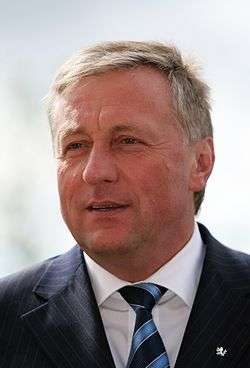
In the 2006 legislative election the ODS was the largest seat holder in the Chamber of Deputies with 81 seats. It formed a government in coalition with the Christian Democrats (KDU-ČSL) and the Green Party (SZ). The party suffered heavy losses in regional and Senate elections in 2008, losing all 12 regional governorships it had previously held.
The Cabinet had lost a no-confidence vote on 24 March 2009. The country was then governed by a newly formed caretaker Cabinet, which was nominated by ODS, ČSSD and SZ. Early elections were set for 9–10 October 2009 but were due to unexpected development in the Constitutional Court and House of Deputies postponed to May 2010.
Civic Democratic Party won the second place after Czech Social Democratic Party and formed a centre-right Government with TOP 09 and Public Affairs. Public Affairs split from government on 22 April 2012 but were replaced by LIDEM. Civic Democratic Party was the same year widely defeated in regional election as finished third overall and won only in the Plzeň region. Party also lost 2010 and 2012 Senate elections.
ODS nominated Přemysl Sobotka for president of the Czech Republic during 2013 election. Sobotka. Sobotka has received only 2.46% of votes and didn't qualify for second round. Ods has held presidential primaries prior the election which Sobotka won. Sobotka's poor showing in general election was caused by government's unpopularity and lack of support from party.[19] The party's leadership supported Karel Schwarzenberg in second round of the election.[20]
2013: Back in opposition
After resignation and fall of Cabinet of Prime Minister Petr Nečas ODS proposed Miroslava Němcová to the position of the Prime Minister to President Zeman saying that she will be able to form a coalition and succeed a vote of confidence in the Chamber of Deputies. However, President Zeman refused to appoint her and called on early elections on 25–26 October 2013. ODS suffered heavy losses. It gained only 16 seats and finished 5th. The party also lost elections of the European parliament and of Senate and municipal in 2014.
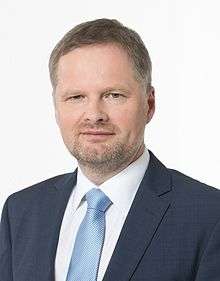
The 24th Congress of the Civic Democratic Party elected on 18–19 January 2014 a new leadership of ODS. The former rector of Masaryk University and minister Petr Fiala was elected as chairman and Member of the European Parliament Jan Zahradil as 1.vice-chairman. In his book Citizens, Democrats and Party members (Czech: Občané, demokraté a straníci) Fiala says that party needs to be attractive to new, young people and ODS shall have experts on economics, health care, education etc.
In the Chamber of Deputies ODS formed an informal relationship, coalition with TOP 09 and both have been opposing laws such as Control report of Value-added tax. On 26 May 2015, ODS, TOP 09 and Dawn of Direct Democracy called on unsuccessful vote of no confidence to Cabinet of Bohuslav Sobotka.
As of December 2015 opinion polls showed ODS with 8.6% nationwide.[21] Some polling agencies and political commentators are of the opinion that ODS is on the path to become main centre-right party again.[22][23][24]
On 16 January 2016, Fiala was re-elected as Leader of the ODS. ODS participated in 2016 regional and Senate election. It received about 10% of votes and its candidates secured seats in all regions. 6 candidates nominated by ODS qualified for second round for Senate. 4 of them were eventually elected Fiala then said that ODS returned to position of major right wing party.[25][26]
Ideology
The ODS is liberal-conservative[27][28][29] and conservative-liberal,[30][31][32] supports economic liberalism,[33] and is Eurosceptic.[4][34]
The party's ideas are very close to those of the British Conservative Party, Swedish Moderate Party, and other liberal-conservative parties in Europe. The basic principles of the party's program are "low taxes, public finances and future without debts, support for families with children, addressable social system, reducing bureaucracy, better conditions for business, a safe state with the transatlantic links. No tricks and populism."
ODS opposes multiculturalism and believes that immigrants from different cultures should be accepted only if they respect Czech culture and learn Czech language and about history. ODS also supports fighting radical Islam which considers as dangerous as Nazism. ODS also opposes accepting Muslim customs such as wearing Burqas. Some wings in ODS are also less supportive of LGBT rights.[35][36][37]
Organisation
Party structure
The highest body of the ODS is Congress which meets every year and elects leadership every two years. The party is led by the Executive Council and Republic Assembly in time between meetings of Congress. Executive body meets every Month and party is led by Panel between meetings of Executive Council. Panel consists of Party's Leader, Deputy Leaders and Chief Whips of the Parliamentary ODS.[38]
ODS is structured similarly to the structure of subdivision of the Czech Republic. The structure consists of local associations. Group of local associations forms area. Areas are organised as parts of Region. [39][40]
Membership
ODS had 18,500 Members in 1991. Number of members was growing along with party's influence and soon got over 23,000. It decreased during political crisis in 1998 to 16,000. Party stopped the decrease after preliminary election and membership was growing once again. It peaked in 2010 when it reached 31,011. The member base started to decline rapidly after 2010. It had only 17,994 members prior the 2013 election.[41] ODS had 14,771 members in May 2015 and the member base was stabilised according to leaders of the party.[42]
Young Conservatives
Young Conservatives (abbreviated MK) is a youth wing of ODS. Young people within the age from 15 to 35 apply for a membership in the MK. The founding congress of MK was held on 8 December 1991 as a result of previous preparations through Charter of Young Conservatives by a group of students at the University of Technology in Brno and Law Students' Association "Všehrd" from Faculty of Law at the Charles University. The Young Conservatives organize wide range of events from meetings with local or national politicians to elections campaigns and international events.
CEVRO Liberal Conservative Academy
CEVRO Liberal Conservative Academy is a think-tank affiliated with ODS. It was established in 1999. Its goal is political education which tries to spread liberal-conservative thinking. In 2005, CEVRO established its own private university known as CEVRO Institute. CEVRO has four newspapers - CEVRO Revue, The Week in European Politics, The Week in Czech Politics and Forthnightly.[43]
International organisations
ODS joined European Democrat Union (EDU) in 1992 as one of the first parties in former Eastern Bloc. Václav Klaus even became a Vice President of EDU. ODS remained in EDU until it became part of European People's Party (EPP) in 2002. ODS rejected to join EPP due to its ideological differences and instead became a member of European Democrats.[44]
ODS joined International Democrat Union (IDU) in 2001.[45] Chairmans of Civic Democratic Party served as Vice Presidents of IDU.
In July 2006, the Civic Democratic Party signed an agreement with the British Conservative Party to leave the European People's Party–European Democrats (EPP-ED) Group in the European Parliament and form the Movement for European Reform in 2009. On 22 June 2009, it was announced that ODS would join the newly formed European Conservatives and Reformists (ECR) parliamentary group, an anti-federalist and Eurosceptic group, which currently its third largest bloc in the European Parliament. ODS then became one of founding members of the Alliance of European Conservatives and Reformists (AECR), a conservative and eurosceptic European political party, defending broader conservative and economically liberal principles. Other members of AECR include Conservative Party, Law and Justice or Freedom and Solidarity. AECR was later renamed to Alliance of Conservatives and Reformists in Europe.
Leadership
| No. | Name | Photo | Since | Until |
|---|---|---|---|---|
| 1 | Václav Klaus |  | 21 April 1991 | 15 November 2002 |
| 2 | Mirek Topolánek |  | 15 November 2002 | 13 April 2010 |
| 3 | Petr Nečas | .jpg) | 20 June 2010 | 17 July 2013 |
| 4 | Petr Fiala |  | 18 January 2014 | Incumbent |
Note: Only properly elected leaders are included.
Expert Team
Expert team serves as shadow cabinet of Civic Democratic Party.[46]
| Resort | Member |
|---|---|
| Economics and Finances | Jan Skopeček (politician) |
| Development of economy and business environment | Alexandra Udženija |
| Foreign Affairs | Jan Zahradil |
| Defence | Jana Černochová |
| Security | Martin Červíček |
| Industry and Business | Martin Kuba |
| Transport | Zbyněk Stanjura |
| Agriculture | Veronika Vrecionová |
| Public Administration | Martin Kupka |
| Digital Society and e-government | Alexander Bellu |
| Justice | Pavel Blažek |
| Social Affairs | Lenka Kohoutová |
| Health | Petr Zimmermann |
| Education | Václav Klaus Jr. |
| Research and Innovations | Jiří Nantl |
| Culture | Marek Pokorný |
| European Affairs | Adéla Kadlecová |
| Environment | Jan Zahradník |
| Regional Development | Martin Baxa |
Election results
Below are charts of the results that the Civic Democratic Party has secured in the Chamber of Deputies, Senate, European Parliament, and regional assemblies at each election.
Chamber of Deputies
| Year | Vote | Vote % | Seats | +/- | Place | Notes | Position |
|---|---|---|---|---|---|---|---|
| 1990 | ... | ... | 41 / 200 |
2nd | Split from Civic Forum in 1991. | Majority Government | |
| 1992 | 1,924,483 | 29.7 | 66 / 200 |
|
1st |
Participated in Coalition with KDS. | Majority Government |
| 1996 | 1,794,560 |
29.6 |
68 / 200 |
|
1st | Minority government supported by oppositional ČSSD. | Minority Government |
| 1998 | 1,656,011 |
27.7 |
63 / 200 |
|
2nd |
Supported a Minority Government of ČSSD. | Opposition Agreement |
| 2002 | 1,166,975 |
24.5 |
58 / 200 |
|
2nd | Main opposition party | in opposition |
| 2006 | 1,892,475 |
35.3 |
81 / 200 |
|
1st |
2006 minority government, 2007-2009 coalition with KDU-ČSL and Greens. | Majority Government |
| 2010 | 1,057,792 |
20.2 |
53 / 200 |
|
2nd |
Coalition government with TOP 09 and VV/LIDEM | Majority Government |
| 2013 | 384,174 |
7.7 |
16 / 200 |
|
5th |
Opposition Party | in opposition |
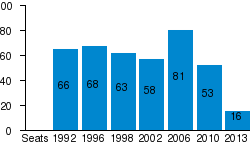 |
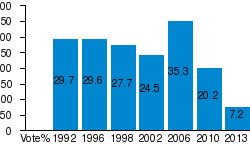 |
Senate
| Election | First round | Second round | Seats | Total Seats | ||||
|---|---|---|---|---|---|---|---|---|
| Votes | % | Places* | Votes | % | Places* | |||
| 1996** | 1,006,036 | 36.5 | 1st | 1,134,044 | 49.2 | 1st | 32 | 32 / 81 |
| 1998 | 266,377 | 27.7 | 1st | 210,156 | 39.1 | 1st | 9 | 26 / 81 |
| 2000 | 203,039 | 23.6 | 1st | 166,133 | 29.5 | 1st | 8 | 22 / 81 |
| 2002 | 165,794 | 24.9 | 1st | 284,537 | 34.6 | 1st | 9 | 26 / 81 |
| 2004 | 241,120 | 33.3 | 1st | 257,861 | 53.8 | 1st | 19 | 37 / 81 |
| 2006 | 354,273 | 33.3 | 1st | 289,568 | 50.4 | 1st | 14 | 41 / 81 |
| 2008 | 252,827 | 24.1 | 2nd | 266,731 | 32.4 | 2nd | 3 | 35 / 81 |
| 2010 | 266,311 | 23.1 | 2nd | 225,708 | 33.1 | 2nd | 8 | 25 / 81 |
| 2012 | 151,950 | 17.28 | 3rd | 117,990 | 22.95 | 2nd | 4 | 15 / 81 |
| 2014*** | 118,268 | 11.52 | 3rd | 53,149 | 11.21 | 4th | 2 | 14 / 81 |
| 2016 | 107,785 | 12.23 | 3rd | 48,609 | 11.46 | 4th | 4[47] | 10 / 81 |
* Places are by number of votes gained.
** The whole Senate was elected. Only one third of Senate was elected in all subsequent elections.
***One of its candidates was elected in coalition with Koruna Česká (party).
Presidential
| Election | Candidate | First round result | Second round result | |||||
|---|---|---|---|---|---|---|---|---|
| Votes | %Votes | Result | Votes | %Votes | Result | |||
| 2013 | Přemysl Sobotka | 126,846 | 2.46 | 8th | — | |||
European Parliament
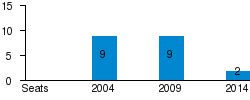 |
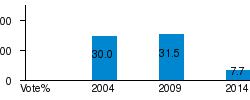 |
Local election
| Year | Vote | Vote % | Seats |
|---|---|---|---|
| 1994 | 37,872,640 | 29.56 | 7,289 |
| 1998 | 18,959,841 | 24.16 | 5,697 |
| 2002 | 20,360,211 | 25.21 | 5,715 |
| 2006 | 39,353,957 | 36.2 | 7,1011 |
| 2010 | 16,943,967 | 18.78 | 5,112 |
| 2014 | 8,930,650 | 9.01 | 2,398 |
Regional election
| Year | Vote | Vote % | Seats | Places | Governors | Coalitions |
|---|---|---|---|---|---|---|
| 2000 | 559,301 | 23.8 | 185 | 7x 1st, 3x 2nd, 3x 3rd | 8 | 8 |
| 2004 | 769,848 |
36.4 |
291 |
12x 1st, 1x 2nd | 12 |
12 |
| 2008 | 687,005 |
23.6 |
180 |
12x 2nd, 1x 3rd | 0 |
4 |
| 2012 | 324,081 |
12.3 |
102 |
1x 1st, 3x 3rd, 7x 4th, 2x 5th | 0 |
0 |
| 2016 | 239,836 |
9.5 |
76 |
3x 3rd, 4x 4th, 4x 5th, 2x 6th, 1x 7th | 0 |
10 |
Czechoslovak parliament
Chamber of Deputies
| Year | Vote | Vote % | Seats | Place | Notes | Position |
|---|---|---|---|---|---|---|
| 1992 | 2,200,937 | 23.0 | 48 | 1st | Participated in Coalition with KDS. | Majority Government |
House of Nations
| Year | Vote | Vote % | Seats | Place | Notes |
|---|---|---|---|---|---|
| 1992 | 2,168,421 | 22.6 | 37 | 1st | Participated in Coalition with KDS |
Elected representatives
Civic Democratic Party has 16 members of the Chamber of Deputies.
|
|
Civic Democratic Party has 10 Senators of the Senate of the Czech Republic.
|
|
Civic Democratic Party has 2 MEPs.
References
- ↑ Němeček, Tomáš. "Mít diplom od Langera". Hospodářské Noviny. Retrieved 2 June 2015.
- ↑ http://www.ods.cz, Tomáš Adámek,. "MojeODS.cz". moje.ods.cz. Retrieved 30 May 2016.
- ↑ John Nagle; Alison Mahr (1999). Democracy and Democratization: Post-Communist Europe in Comparative Perspective. SAGE Publications. p. 188. ISBN 978-0-7619-5679-2.
- 1 2 Geoffrey Pridham (2008). "European Party Co-operation and Post-Communist Politics: Euroscepticism in Transnational Perspective". In Aleks Szczerbiak; Paul Taggart. Opposing Europe?: The Comparative Party Politics of Euroscepticism: Volume 2: Comparative and Theoretical Perspectives. OUP Oxford. p. 89. ISBN 978-0-19-925835-2.
- ↑ Seán Hanley (2006), "Blue Velvet: The Rise and Decline of the New Czech Right", in Aleks Szczerbiak; Seán Hanley, Centre-Right Parties in Post-Communist East-Central Europe, Routledge, p. 29
- ↑ Zdenka Mansfeldová (2013). "The Czech Republic". In Sten Berglund et al. The Handbook of Political Change in Eastern Europe (3rd ed.). Edward Elgar. p. 232. ISBN 978-0-85793-537-3.
- ↑ Tomáš Kostelecký (1995). "Changing party allegiances in a changing party system: the 1990 and 1992 parliamentary elections in the Czech Republic". In Gordon Wightman. Party Formation in East-Central Europe. Edward Elgar. p. 80. ISBN 1-85898-132-8.
- ↑ William L. Miller et al. (1998). Values and Political Change in Postcommunist Europe. Palgrave Macmillan. p. 78. ISBN 978-1-349-39549-1.
- ↑ Elizabeth Bakke (2010). "Central and Eastern European party systems since 1989". In Sabrina Ramet. Central and Southeast European Politics since 1989. Cambridge University Press. p. 78. ISBN 978-1-139-48750-4.
- ↑ Constantijn Kortmann; Joseph Fleuren; Wim Voermans, eds. (2006). Constitutional Law of 10 EU Member States: The 2004 Enlargement. Kluwer. p. 252. ISBN 978-90-13-03468-4.
- ↑ "He's against the Lisbon Treaty and not keen on the euro... meet the new president of the EU". The Daily Mail. 1 January 2009.
- ↑ Hanley (2008), p. xi
- ↑ Hanley (2008), p. 89
- 1 2 Hanley (2008), p. 96
- ↑ Central and South-Eastern Europe 2004 (4 ed.). London: Routledge. 2004. p. 216. ISBN 978-1-85743-186-5.
- ↑ Rutland, Peter (1998). The challenge of integration. M. E. Sharpe. p. 84. ISBN 978-0-7656-0359-3.
- ↑ Hanley (1998), p. 140
- ↑ Hanley (1998), p. 143
- ↑ "To byl průšvih, pane kandidáte ODS Sobotko. Ptali jsme se u Vás doma". Parlamentní Listy. Retrieved 30 June 2016.
- ↑ "Lídři ODS podpořili Schwarzenberga. I přes Zahradilovo varování". iDNES.cz. 15 January 2013. Retrieved 30 June 2016.
- ↑ "Vedoucí ANO dále ztrácí, ukazuje průzkum". Novinky.cz. Retrieved 24 December 2015.
- ↑ Koukal, Josef. "Vstává ODS z popela?". Novinky.cz. Retrieved 16 January 2016.
- ↑ "Velký návrat ODS? Podle aktuálního průzkumu volebních preferencí to tak vypadá". Parlamentní Listy. Retrieved 16 January 2016.
- ↑ Nový, Tomáš. "TOPka pomalu končí, otěže pravice třímá ODS, ukázal průzkum". Parlamentní Listy. Retrieved 16 January 2016.
- ↑ "ODS vstává z popela, potáceli jsme se na hranici přežití, vracíme se jako lídr pravice, říká Fiala". Aktuálně.cz - Víte co se právě děje. Retrieved 10 October 2016.
- ↑ "ODS vrací úder. Stává se nejsilnější pravicovou stranou v Česku? | Domov". Lidovky.cz. 9 October 2016. Retrieved 10 October 2016.
- ↑ "The Tories' new EU allies". BBC News. 22 June 2009. Retrieved 14 August 2011.
- ↑ Richter, Jan (13 April 2010). "Number 3 for Jesus: Czech parties get numbers to run with in May's elections". Radio Prague.
- ↑ Traynor, Ian (19 May 2009). "European election: Brussels braces for big protest vote". The Guardian.
- ↑ Rudolf Andorka (1999). A Society Transformed: Hungary in Time-space Perspective. Central European University Press. p. 163. ISBN 978-963-9116-49-8.
- ↑ Krisztina Arató; Petr Kaniok (2009). Euroscepticism and European Integration. CPI/PSRC. p. 191. ISBN 978-953-7022-20-4.
- ↑ Vít Hloušek; Lubomír Kopecek (2013). Origin, Ideology and Transformation of Political Parties: East-Central and Western Europe Compared. Ashgate Publishing, Ltd. p. 177. ISBN 978-1-4094-9977-0.
- ↑ Paul G. Lewis (2000). Political Parties in Post-Communist Eastern Europe. Routledge. p. 164. ISBN 978-0-415-20182-7. Retrieved 6 February 2013.
- ↑ Hanley, Sean (2002). "Party Institutionalisation and Centre-Right Euroscepticism in East Central Europe: the Case of the Civic Democratic Party in the Czech Republic" (PDF). 29th ECPR Joint Sessions of Workshops. Archived from the original (PDF) on 7 June 2011.
- ↑ "ODS: Máme řešení migrační krize. Nechceme jen kritizovat". Parlamentní Listy. Retrieved 1 July 2016.
- ↑ "Naše válka – ODS – Občanská demokratická strana". Občanská demokratická strana (in Czech). Retrieved 1 July 2016.
- ↑ Weikert, Petr (20 January 2015). "ODStraníme islám". Euro.cz. Retrieved 1 July 2016.
- ↑ "Stanovy – O nás – ODS – Občanská demokratická strana". Občanská demokratická strana (in Czech). Retrieved 30 June 2016.
- ↑ "Struktura ODS". www.odsregionliberec.cz. Retrieved 30 June 2016.
- ↑ "Regiony – ODS – Občanská demokratická strana". Občanská demokratická strana (in Czech). Retrieved 30 June 2016.
- ↑ Rieger, Lukáš (23 September 2014). "Počet členů stran včera a dnes" (PDF). Čtrnáctideník. 15/2014. Retrieved 30 June 2016.
- ↑ "Vedení ODS mobilizuje členy, mají shánět nové partajníky". Novinky (in Czech). Retrieved 30 June 2016.
- ↑ Policy Analysis in the Czech Republic. Bristol: University of Bristol. 2016. pp. 280–281. ISBN 978-1-44731-814-9.
- ↑ Mrklas, Ladislav. "ODS a zahraniční partneři". CEVRO. Retrieved 30 June 2016.
- ↑ http://www.webaction.cz, Lev Doležal,. "Revue Proglas 4/2001 - Komentář: ODS mezi stagnací a růstem - CDK". old.cdk.cz. Retrieved 30 June 2016.
- ↑ Kadrnka, Jiří. "Jiří Kadrnka: První krok v čele ODS? Sestavit stínovou vládu – ODS – Občanská demokratická strana". Občanská demokratická strana (in Czech). Retrieved 30 June 2016.
- ↑ Including Zdeněk Nytra who ran as independent.
Bibliography
- Hanley, Sean (2008). The New Right in the New Europe: Czech Transformation and Right-Wing Politics, 1989–2006. London: Routledge. ISBN 978-0-415-34135-6.
External links
| Wikimedia Commons has media related to Občanská demokratická strana. |
- Official website (English) (Czech)